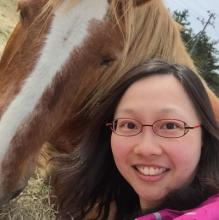Carmen Chan
What are your main responsibilities or activities in your current position?
Research into the molecular mechanism of how growth cones respond to guidance molecules during neurodevelopment. Work consists of mostly designing experiments, benchwork, literature searches, learning new laboratory techniques, giving presentations at scientific conferences, and occasionally mentoring summer students. Also, there are opportunities to give talks at local universities.
How does your current work relate to your graduate degree?
My current research topic is very similar to my graduate research. Specifically, I am investigating how a growth cone responds to the microenvironment it finds itself in. While in graduate school I looked at growth cones in an injured adult spinal cord (an abnormal environment); now I look at growth cones in the sensory system during development (a natural environment). So these topics share a lot of common background, and I'm using a lot of the same techniques learned during grad school.
What do you like and what do you find challenging about your current position?
On the technical side, there are so many amazing new technologies (e.g. new microscope systems, molecular cloning techniques) coming out that help answer questions in the field of neurodevelopment, while creating new questions in its wake. It takes effort to keep up. My current work is within a government research institute that has many labs in many different fields, and only a few share similar research fields as ours. It can be difficult to find someone to discuss problems with. As for things I like, they are the top-notch equipment (especially microscope systems) and services (e.g. mass spectrometry, animal care, DNA sequencing, etc., etc,) available to all researchers here.
Is your current career path as you originally intended?
Yes and no. Yes, I wanted to be a postdoc, and I got it (and still am). No because I did not plan to be a postdoc for so long.
What motivated you to pursue graduate work at UBC?
I wanted to be a scientist since I was a kid, so I pursued graduate studies after obtaining my BSc at UBC. The professors at UBC are great mentors, and UBC has a strong community of research scientists.
What did you enjoy the most about your time as a graduate student at UBC?
The local community of scientists, and at the same time plenty of opportunities to go to conferences abroad. The professors/PIs at UBC are the kind who care about their students – the best kind.
What key things did you do, or what attitudes or approaches did you have, that contributed to your success?
So far I'd say my biggest success is getting to live and survive in a foreign country, which never ceases to surprise and amaze me with its beauty and its contrasts to my previous places of abode. The thing that I did leading up to this was, first of all, to be brave enough to get up and move. Once here, I continued to be who I am and maintain my own identity while at the same time learning and appreciating the local people's way of doing things – which can be very different from what I am used to.
What is your best piece of advice for current graduate students preparing for their future careers?
Keep an open mind; do not single-mindedly aim for academia. Learn other skills, e.g. take a minor in business, take teaching lessons, or join a teaching club. While in grad school, be a teaching assistant even if you don't need the extra income. Be active in postdoctoral and other (research-related or not) societies.
How did you find out about/obtain your current position?
A Japanese exchange student came to our graduate lab, and this allowed me to network with his lab in Japan which was also in the field of spinal cord regeneration research. Got a job offer from their boss after I graduated and received a postdoc fellowship from the Japanese government. This was followed by a job search on the internet when the first Japanese lab I worked at relocated somewhere else. This is how I found out about the current lab that does developmental axon guidance research, which turns out to be just as interesting as regeneration research.
What challenges did you face in your graduate degree, or in launching your career?
Language is a big obstacle for anyone who moves to a foreign country. RIKEN welcomes international researchers and has plenty of bilingual staff to assist foreigners. However, one eventually has to survive on their own, so making the effort to learn the new language early on should be a priority.
How are jobs normally posted and filled in your organization or industry?
Job opportunities are usually posted on RIKEN's internet site and sometimes through word of mouth and networking.
